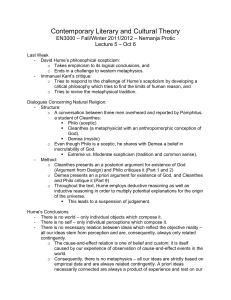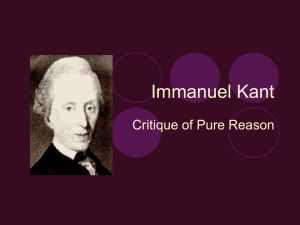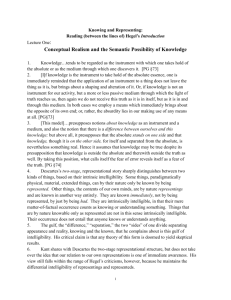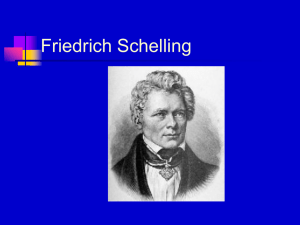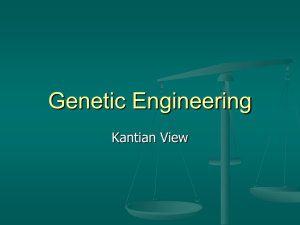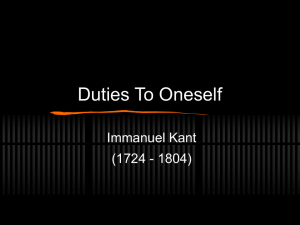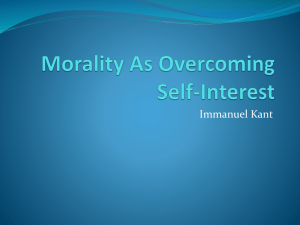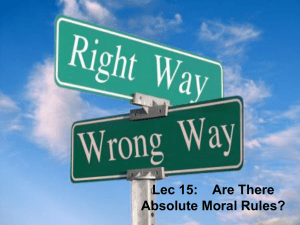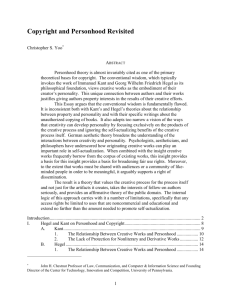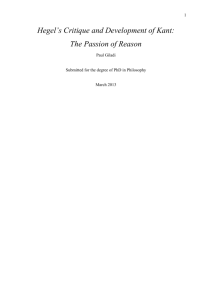21 Metaphysics in Kant and Post
advertisement
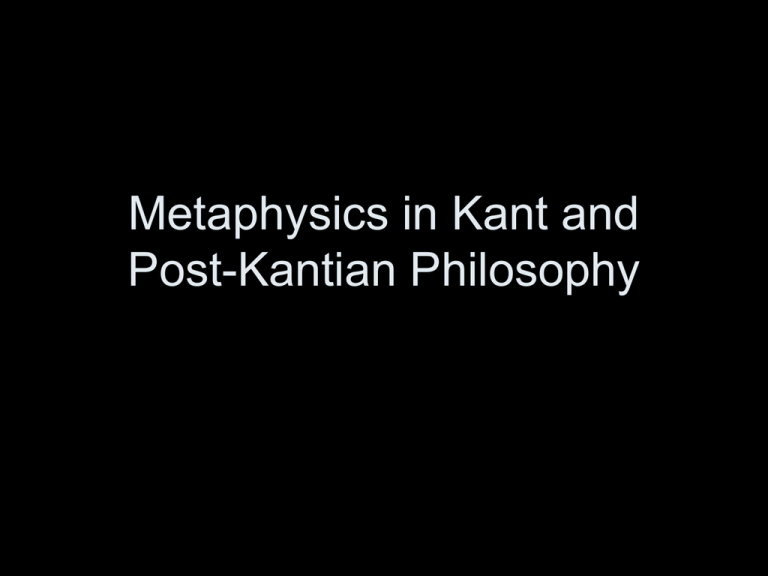
Metaphysics in Kant and Post-Kantian Philosophy Immanuel Kant Kant’s Copernican Revolution • Rationalists: universality and necessity require synthetic a priori • Hume: source not in the world but in us • Kant: source is within us— but it is reason, not custom or habit Kant’s Categories • There are innate concepts— the categories • They are logical forms of judgment • They apply only to experience Knowledge —> Objects • “It has hitherto been assumed that our knowledge must conform to the objects; but all attempts to ascertain anything about these objects a priori, by means of concepts, and thus to extend the range of our knowledge, have been rendered abortive by this assumption. Let us then make the experiment whether we may not be more successful in metaphysics, if we assume that the objects must conform to our knowledge.” Kant & Copernicus • “We here propose to do just what Copernicus did in attempting to explain the celestial movements. When he found that he could make no progress by assuming that all the heavenly bodies revolved round the spectator, he reversed the process, and tried the experiment of assuming that the spectator revolved, while the stars remained at rest. We may make the same experiment with regard to the intuition of objects. If the intuition must conform to the nature of the objects, I do not see how we can know anything of them a priori. If, on the other hand, the object conforms to the nature of our faculty of intuition, I can then easily conceive the possibility of such an a priori knowledge.” Laws of the Understanding “Before objects, are given to me, that is, a priori, I must presuppose in myself laws of the understanding which are expressed in concepts a priori. To these concepts, then, all the objects of experience must necessarily conform.” Limits of Knowledge • “. . . we only know in things a priori that which we ourselves place in them.” • Laws that govern realm of experience are in us— the laws of the understanding • So, we can know things only as experienced by us— not as they are in themselves Kant’s Rationalism • There are innate ideas: pure concepts of the understanding (the categories) • There are synthetic a priori truths (laws of the understanding) • But they apply only within realm of experience Phenomena • Phenomena: appearances, objects as we perceive them – Categories apply to them – A priori principles apply to them – We can know them with universality and necessity Noumena • Noumena: things-in-themselves, unconditioned by our cognitive faculties – Categories don’t apply to them – A priori principles don’t apply to them – We can’t know them at all Descartes/Hume/Kant Descartes Hume Kant Synthetic a priori? Yes No Yes Knowledge Beyond exp. Yes No No Yes No No Knowledge of world as it is Plato’s Philosophy of Mind The Good • Participation This is a triangle Form Recollection Perception Object Kant’s Philosophy of Mind • Construction This is a triangle Concept Perception Object Kant’s Philosophy of Mind • Understanding This is a triangle Concept Appearance Sensibility Thing in itself G. W. F. Hegel Hegel • Georg Wilhelm Friedrich Hegel (1770-1831) was perhaps the last great philosophical system builder • His distinctively dynamic form of idealism set the stage for other nineteenth-century Western philosophers • Hegel, like Kant, is an idealist: Everything depends on mind • The world as we know it is something we construct Critique of Kant • Noumena (things-in-themselves) play no role in Kant’s system • The pure concepts of the understanding do not apply to them • So, they do not fall under the categories • We cannot say that things-in-themselves, in combination with our cognitive faculties, cause things to appear as they do, for causation is one of the categories • We cannot even officially say that things-inthemselves exist! Historicism • Kant maintained that we could have universal and necessary knowledge of the world by uncovering the laws of the understanding • To give us universal and necessary knowledge, those laws must be constant; they must be the same for each person, in all times and circumstances • Why, however, should we expect human beings to construct the world in the same way, at all times and places, in all circumstances, in all cultures? Historicism • Hegel contends that the way in which we construct the world develops systematically over time • Philosophy, like other aspects of human thought, thus varies with historical circumstances • “Philosophy is its own time raised to the level of thought.” Absolute Spirit • Hegel tells the story of Spirit or Mind (in German, Geist), which progresses through a variety of stages to reach Absolute Knowledge Dynamic Principles • This is not to say that philosophy cannot express any universal or necessary truths • But they are not the kinds of truths sought by Kant or other previous rationalists • What stays constant across historical circumstances are not a priori propositions or innate concepts but the set of dynamic principles governing the development of our ways of constructing the world Dynamic Principles • Hegel finds some universal and necessary truths • But they are high-level, dynamic principles governing the development of thought • The best known is the thesis-antithesissynthesis pattern Thesis • People adopt a certain way of looking at and thinking about the world (the thesis) • Because it is only partially correct, over time people encounter contrary evidence, counterexamples, anomalies, and contradictions Antithesis • Inspired by these, they shift to a new and contrary way of looking at and thinking about things (the antithesis). • That too is only a partial truth, however, so it also gradually confronts contrary evidence, counterexamples, anomalies, and contradictions. Synthesis • The conflict between thesis and antithesis is eventually transcended in a synthesis that draws elements from both while transforming the way people see and think • That becomes a new thesis, and the process begins again Social Character of Thought • Hegel sees human thought as essentially social • The social and historical context of thought is crucial • We learn our language, which provides our basic categories of thought, from other people, at a particular time, in the context of a particular society • What Kant and other rationalists take as stemming from our nature as knowers Hegel sees as reflecting a specific social background Dynamics of the Self • Hegel, rejecting things-in-themselves, sees the unity of the self not as a given but as an achievement • His Phenomenology of Spirit (phenomenology = study of phenomena, that is, appearances) traces the development of the self through a variety of stages, including one he famously terms “unhappy consciousness” Unhappy Consciousness • The self is divided, alienated from itself • We overcome that alienation socially • We achieve self-consciousness by – recognizing other people as self-conscious agents, – being recognized as selves by them, and – recognizing that recognition ourselves • We become integrated selves by being seen as such by others we recognize as selves Myth of the Given • Hegel rejects what he refers to as immediacy, the sharp divide in Kant and the empiricists between sensibility and understanding— between perception and conceptual knowledge • Hegel denies that we can distinguish any given, preconceptual portion of our experience. The concepts we have shape the way we perceive the world Relativism • Relativism: truth is relative to – Individual – Society – Culture – Interpretive community – Historical epoch – Conceptual framework Friedrich Nietzsche • Nietzsche (18441900) • Historicism: truth is relative to a historical period Nietzsche • Truth doesn’t develop rationally, according to any discernible laws • It is irrational, driven by the will to power • Two-level theory: “What if this chemistry would reveal that in these areas too the most glorious colors arise from low, despised materials?” Historicism and Relativism • “Everything, however, became what it is. There are no eternal facts. There are no absolute truths. Therefore what is needed from now on is historical philosophizing and with it the virtue of modesty.” Interpretation • Knowledge doesn’t progress according to laws • It doesn’t necessarily progress at all • Science must become playful, developing new ways of seeing and interpreting the world World as Projection • “Because we looked at the world for thousands of years with moral, aesthetic, religious demands, with blind inclination, passion, or fear, and abandoned ourselves to the bad habits of illogical thinking, this world has gradually become so wondrously multicolored, terrible, meaningful, soulful, that it has taken on color—but we have been the colorists. The human intellect projected its errors as appearances and its basic assumptions into things.” God is Dead • “New struggles.—After Buddha was dead, his shadow was still shown for centuries in a cave—a tremendous, shiver-inducing shadow. God is dead; but given humans as they are, there may be caves for thousands of years in which his shadow is shown.—And we— we still have to defeat his shadow!” The Madman • “Have you not heard of that madman, who lit a lantern in the bright morning, ran to the market and cried incessantly: —‘I’m looking for God! I’m looking for God!’” The Madman • “As there were many who stood together there who did not believe in God, he excited much laughter. Is he lost? said one. Did he wander off like a child? said another. Or does he keep himself hidden? Is he afraid of us? Did he go to sea? emigrate?—in such a way they laughed and yelled in disorder.” • Nietzsche here echoes Elijah taunting the priests of Ba’al (1 Kings 18:27). The Madman • “The madman jumped into their midst and pierced them with his gaze. “Where is God?” he cried. “I will tell you! We killed him—you and I! We all are his murderers!” The Madman • “God is dead! God remains dead! And we killed him! How can we comfort ourselves, the murderers of all murderers? …Isn’t the size of this deed too large for us? Don’t we have to become gods just to appear worthy of it?” Revaluation of Values • “What do you believe?—This: that the weights of all things must be determined afresh.” Authenticity • “What does your conscience say?— ‘You are to become the person you are.’” Coherence Theory • A sentence or belief is true if it coheres with a comprehensive theory of the world • Francis Herbert Bradley (1846-1924) decries facts as a "vicious abstraction." • Holism: explain parts in terms of wholes • Explain things in terms of context, function Coherence • We cannot evaluate knowledge claims apart from an entire system • A true belief coheres with a maximally coherent and comprehensive system of beliefs • So, to assess the truth of a belief, we must see how it fits with our best overall system • We cannot evaluate beliefs one-by-one; we must evaluate them in the context of a system The Web of Belief • Experience Objections to Coherence • Defining truth in terms of coherence would be circular – Coherence –> consistency: can all be true – But then coherence is defined in terms of truth Objections to Coherence • Could there be more than one comprehensive and coherent system of beliefs? • What about the world? Charles Sanders Peirce (1839-1914) Pragmatism • Charles Sanders Peirce develops the pragmatic theory of truth • Principle of pragmatism: There is no difference in meaning without a difference in practice Pragmatism • Meaning depends entirely on practice • To get clear about the meanings of our terms and thoughts, we need to be clear about their practical antecedents and effects Scientific Inquiry • Thought aims at truth. Not all practice does • But scientific inquiry aims at truth • It aims in particular at stable belief: beliefs that will not have to be given up in the face of further information Defining Truth • The correspondence theorist defines scientific activity as that activity that aims at the truth • Peirce defines the truth is that at which scientific activity aims Peirce on Truth • “The opinion which is fated to be ultimately agreed to by all who investigate, is what we mean by the truth, and the object represented in this opinion is the real.” Limit of Scientific Inquiry • Truth, then, is a kind of coherence (or, as Peirce prefers to call it, concordance) • with the ideal limit of scientific inquiry • The truth is what we all eventually are bound to agree on Belief Revision • Science is a process of belief revision • When we encounter new information and update our beliefs, we keep some, reject others, and add new ones • Truth is what works in that context of belief revision • Truth is that on which our process of belief revision stabilizes Bertrand Russell (1872-1970) Missing Explanation • But why do we all eventually agree on, say, p? • The realist/correspondence theorist can say, because p is true • What can the pragmatist say? Argument for Idealism • We have reason to believe that something exists only if we can know it • We can know an object only by making it an object of consciousness • Any object of consciousness is conditioned by consciousness • Anything conditioned by consciousness is minddependent • So, we have reason to believe that a thing exists only if it is mind-dependent The Realists’ Critique • Premises 3 and 4: – Any object of consciousness is conditioned by consciousness – Anything conditioned by consciousness is minddependent • Realists: I see a cat. It becomes an object of consciousness. So, the cat is conditioned by consciousness? So, the cat is minddependent? That’s absurd! The cat isn’t affected by my seeing or not seeing it. Equivocation in Idealism • G. E. Moore’s “The Refutation of Idealism” • The idealists use ‘object of consciousness’ ambiguously • Actual objects (causes of perception— things-inthemselves) vs. internal objects (effects— appearances) Equivocation in Idealism • We know actual objects by representing them as internal objects • The internal object is conditioned and minddependent; the actual object is neither • Common Sense: “There are at least two material objects in the universe.” Actual Objects • Actual objects— things-in-themselves— are not conditioned by being known • But they can be known— by being represented as internal objects, as appearances • Representationalism: We know things-inthemselves by representing them to ourselves as appearances Idealist’s Argument Revised • We have reason to believe that something [an actual object] exists only if we can know it • We can know an [actual] object only by making it an [internal] object of consciousness • Any [internal] object of consciousness is conditioned by consciousness • Anything conditioned by consciousness is minddependent • So, we have reason to believe that a thing [an actual object] exists only if there is a mind-dependent internal object.


